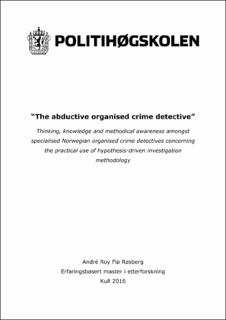| dc.description.abstract | The implementation of a hypothesis-driven investigative methodology, and the perceived benefits that the methodology entails, is something that the Norwegian police are striving towards. How does this concern the practical work of organised crime detectives? I hope this research project will contribute with useful perspectives on the subject based on the participants’ thinking, knowledge and methodical awareness.
This research project has a qualitative design. The method for data collection was semi-structured qualitative interviews and a case scenario. The method used to analyse the data material was theory-driven thematic analysis, with a critical approach. I have used a selection of relevant literature and theory, which covers essential aspects in the area of criminal investigation and organised crime. This involves various ideals which make high-quality investigation a profession or a craft, psychosocial sources of error, proactive and offender-driven focus, and the importance for abductive inference in investigations.
Amongst the central features in the conclusion and contribution of this project is that the participants report that they do not utilise the hypothesis-driven methodology in their work, as they regard it as superfluous and, in their work, unnecessary, as the investigation evolves naturally through investigative steps and experience. These notions are mainly present in drug-related cases, where one often has a suspect and information from covert investigation methods, which gives the detectives a "good overview". On the other hand, several detectives expressed that they lack the theoretical foundation and lack experience in the practical use of the hypothesis-driven investigative methodology. These features suggest that the unit of investigation of organised crime has yet to formulate a good practice for the use of hypothesis-driven investigation methodology. | en_US |
